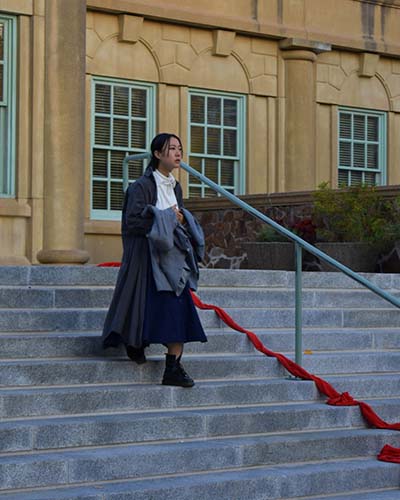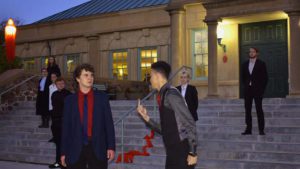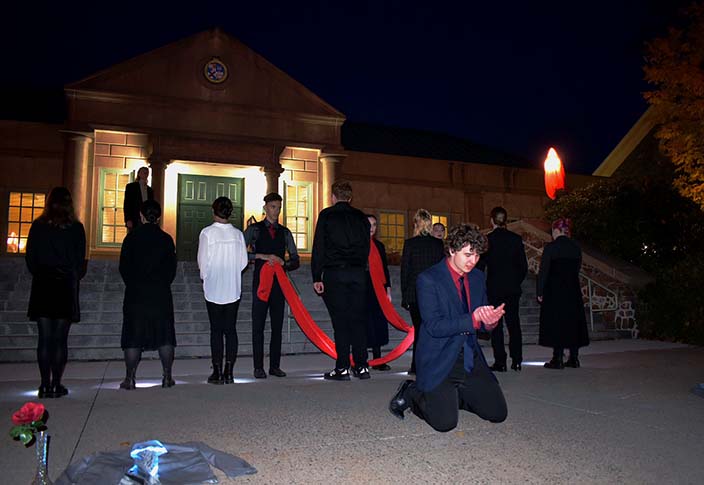Classics in the Quad returns after year-and-a-half-long hiatus
When the cast of Antigone stepped on stage on the evening of October 22, they faced a Quad packed to the brim with students, faculty and community members.
The King’s Theatrical Society performed Sophocles’ Antigone as part of Classics in the Quad—an annual King’s tradition in which first- and second-year students perform a piece of Greek theatre on the steps of the library. Antigone marks the first Classics in the Quad performance since the pandemic.
Before the show began, the producers gave a small speech to welcome the audience and introduce director Tessa Hill.
Hill is a third-year King’s student majoring in Contemporary Studies and English. While she’s been involved with the KTS since her first year, this was her first time directing a theatrical production.
“I was drawn to Antigone because it felt relevant to me,” she said. “The story of a young woman and her power and will, who as a character has this incredible emotional complexity and very complicated motivation.”

Vicky Li performs the role of Ismene in the KTS Classics in the Quad production of Antigone.
The plot of Antigone picks up shortly after the conclusion of Oedipus Rex, another famous Sophocles play. The story revolves around Oedipus’s children—sons Eteocles and Polynices, and daughters Ismene and Antigone. Eteocles and Polynices die fighting each other for the throne that Oedipus left empty. Creon, Oedipus’s brother-in-law, steps in as the new king and decrees that only one deceased brother is allowed proper burial rites—the other must be left unburied on the battle ground. The punishment for defying this rule is death. Antigone fights Creon in his decision, believing both her brothers deserve a proper burial.
“It’s a play that begins very tragically, and ends even more tragically,” Hill said with a laugh.
The cast performed Antigone with minimal props and a simple set—something that elevated the overall performance as the audience was able to give their undivided attention to the story. A red silk, which would come to represent death in the final scenes, wound its way up the library steps, and Antigone’s deceased brothers were cleverly represented by two suit jackets with lights woven into the fabric. The entire cast wore simple suits, skirts and dresses in well-coordinated shades of black, red, white and blue, capturing the show’s somber atmosphere.
 Em Arruda delivered a standout performance in her portrayal of Antigone, fully present and passionate in each of her lines. Despite it being a windy evening, the actors had no problem projecting their voices, which echoed off the nearby buildings. Levi Jacobsen performed in the role of the main antagonist Creon, with the cold, calculated energy of a politician. He and actor Shehab Wahdan, who played Creon’s son Haemon, captured the audience’s attention with an iron grip during their scenes together. All three of these actors shared great onstage chemistry, which made for intense, electrifying moments of confrontation.
Em Arruda delivered a standout performance in her portrayal of Antigone, fully present and passionate in each of her lines. Despite it being a windy evening, the actors had no problem projecting their voices, which echoed off the nearby buildings. Levi Jacobsen performed in the role of the main antagonist Creon, with the cold, calculated energy of a politician. He and actor Shehab Wahdan, who played Creon’s son Haemon, captured the audience’s attention with an iron grip during their scenes together. All three of these actors shared great onstage chemistry, which made for intense, electrifying moments of confrontation.
To say the cast’s hard work paid off would be an understatement. As the play progressed, and the plot grew metaphorically darker, the sky around the Quad also grew dark. Hill’s blocking kept the actors close to light sources and in the last scene, the chorus made use of flashlights, which worked thematically and to provide light sources to the actors.

Hill said that for most of the cast, Antigone was their first in-person performance since March 2020. Because Classics in the Quad casts mostly first-and-second-year students, many of the actors had never lived on campus or experienced King’s culture before.
“It’s been so incredible to see how they’ve committed and how they’ve come together in the past month,” she said. “It’s made me so hopeful about theatre on campus and theatre in general.”
Photography: Livy Lyle

